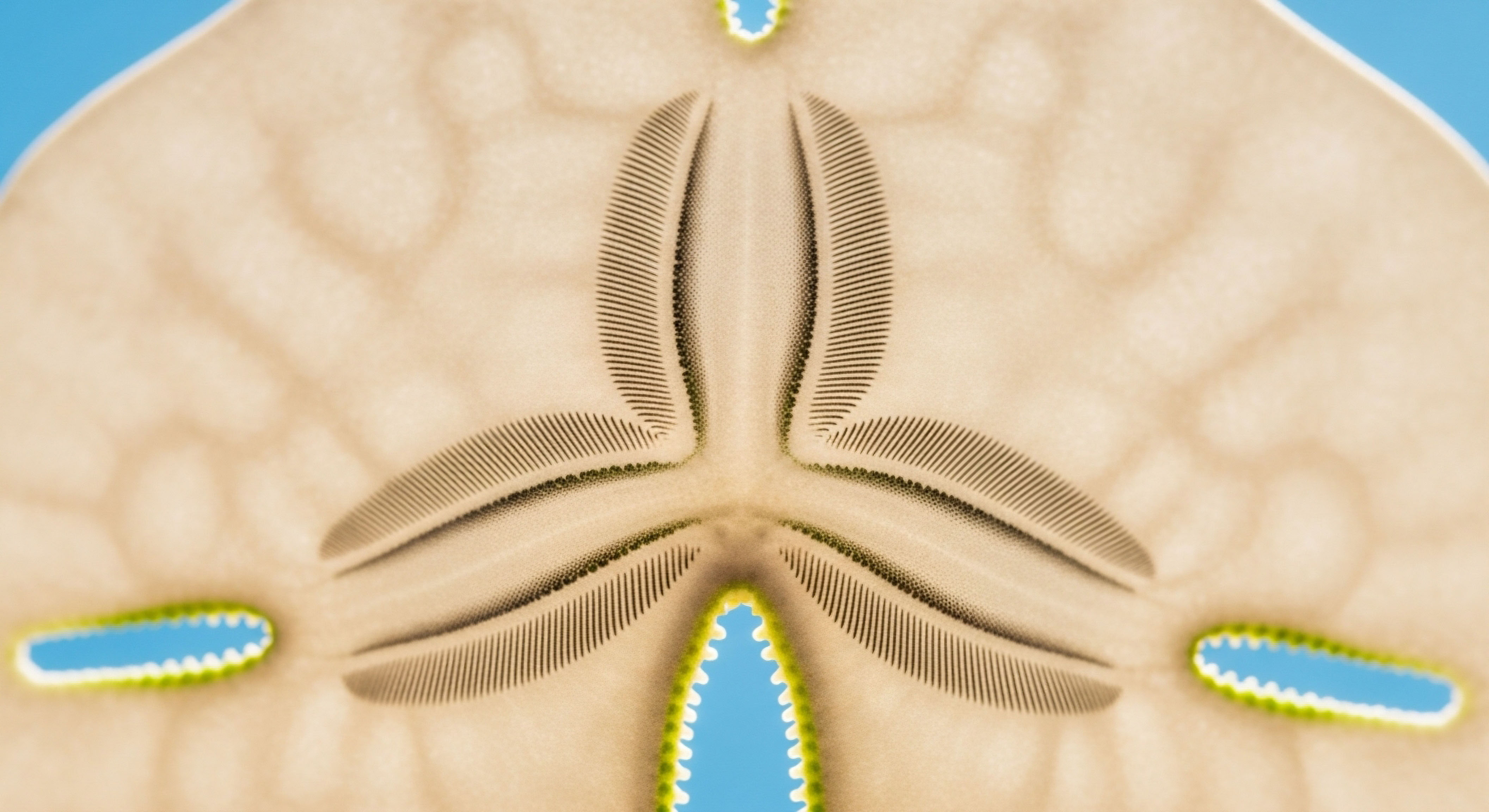

Fundamentals
Many individuals experiencing shifts in their vitality often find themselves grappling with a constellation of symptoms that defy easy explanation. Perhaps you have noticed a persistent decline in energy, a diminishing sense of drive, or changes in body composition that seem resistant to your usual efforts.
These experiences are not merely isolated occurrences; they frequently signal deeper systemic adjustments within the body, particularly concerning hormonal balance. Understanding these internal communications is the first step toward reclaiming a sense of well-being and function.
Testosterone, a vital signaling molecule for both men and women, plays a far more expansive role than commonly perceived. While often associated with male characteristics, its influence extends to metabolic regulation, bone density, cognitive clarity, and cardiovascular health.
When the body’s production of this hormone declines, either due to age, lifestyle factors, or underlying medical conditions, the ripple effects can be felt across multiple physiological systems. This decline, often termed hypogonadism in men, can manifest as a range of symptoms that significantly impact daily life.
For those considering hormonal optimization protocols, such as Testosterone Replacement Therapy (TRT), a thorough evaluation extends beyond simply measuring hormone levels. A critical aspect of this assessment involves a detailed examination of cardiovascular health. The heart and the endocrine system are intimately connected, functioning as components of a larger, integrated biological network. Any existing cardiovascular risk factors must be carefully considered to ensure that any therapeutic intervention supports overall health without introducing unintended complications.
Hormonal shifts can manifest as varied symptoms, signaling deeper systemic changes within the body’s intricate communication network.

The Endocrine System and Cardiovascular Interplay
The endocrine system, a complex network of glands and organs, produces and releases hormones that regulate nearly every bodily process. These hormones act as messengers, transmitting instructions throughout the body to maintain homeostasis. Testosterone, for instance, influences the health of blood vessels, lipid metabolism, and insulin sensitivity, all of which are directly relevant to cardiovascular function. A deficiency in this hormone can contribute to unfavorable changes in these parameters, potentially increasing the likelihood of cardiovascular concerns.
Conversely, the presence of established cardiovascular risk factors, such as hypertension, dyslipidemia, or a history of cardiac events, necessitates a cautious and individualized approach to hormonal interventions. These pre-existing conditions represent a modified physiological landscape that must be navigated with precision. The goal of any therapeutic strategy is to optimize hormonal status while simultaneously safeguarding cardiovascular integrity.

What Constitutes Cardiovascular Risk?
Identifying cardiovascular risk involves assessing a range of factors that collectively predict the likelihood of developing heart disease or experiencing a cardiovascular event. These factors are often interconnected, forming a complex web of influences on arterial health and cardiac function. Understanding these elements is paramount when evaluating eligibility for endocrine system support.
- Hypertension ∞ Persistently elevated blood pressure places increased strain on the heart and blood vessels, contributing to arterial stiffness and damage over time.
- Dyslipidemia ∞ Abnormal levels of lipids, such as high low-density lipoprotein (LDL) cholesterol or low high-density lipoprotein (HDL) cholesterol, contribute to the buildup of plaque within arteries.
- Diabetes Mellitus ∞ Elevated blood glucose levels can damage blood vessels and nerves, accelerating the progression of atherosclerosis and increasing the risk of heart disease.
- Obesity ∞ Excess body fat, particularly around the abdomen, is associated with inflammation, insulin resistance, and adverse lipid profiles, all detrimental to cardiovascular well-being.
- Smoking History ∞ Tobacco use directly harms blood vessels, reduces oxygen delivery to the heart, and promotes clot formation, significantly increasing cardiovascular event risk.
- Family History of Early Cardiovascular Disease ∞ A genetic predisposition can increase an individual’s susceptibility, even in the absence of other modifiable risk factors.
Each of these elements contributes to the overall cardiovascular risk profile. A comprehensive clinical assessment considers these factors not in isolation, but as interacting components that shape an individual’s physiological state. This holistic perspective is essential for making informed decisions regarding hormonal optimization.


Intermediate
When considering Testosterone Replacement Therapy, particularly for individuals presenting with symptoms of hormonal imbalance, the clinical approach involves a meticulous evaluation of both the endocrine system and the broader physiological context, with a particular emphasis on cardiovascular status. The decision to initiate or adjust hormonal optimization protocols is a collaborative process between the individual and their clinical team, grounded in evidence-based guidelines and a deep understanding of individual biochemistry.
For men experiencing symptoms consistent with low testosterone, such as diminished libido, reduced muscle mass, increased body fat, and persistent fatigue, a standard protocol often involves weekly intramuscular injections of Testosterone Cypionate. This form of testosterone is designed for sustained release, providing a stable hormonal environment.
However, the introduction of exogenous testosterone can sometimes suppress the body’s natural production of testosterone and impact fertility. To mitigate these effects, Gonadorelin is frequently incorporated into the protocol, administered via subcutaneous injections twice weekly. Gonadorelin acts on the pituitary gland, stimulating the release of luteinizing hormone (LH) and follicle-stimulating hormone (FSH), thereby supporting endogenous testosterone production and testicular function.
Another consideration in male hormonal optimization is the potential for testosterone to convert into estrogen, a process known as aromatization. Elevated estrogen levels in men can lead to undesirable side effects, including fluid retention and gynecomastia. To manage this, an aromatase inhibitor like Anastrozole is often prescribed as an oral tablet, typically twice weekly, to block this conversion.
In certain scenarios, particularly for men seeking to maintain fertility or those discontinuing TRT, medications such as Enclomiphene, Tamoxifen, or Clomid may be utilized to directly stimulate LH and FSH production, encouraging the testes to resume natural testosterone synthesis.
TRT protocols for men often combine Testosterone Cypionate with Gonadorelin to maintain natural production and Anastrozole to manage estrogen conversion.

Hormonal Balance for Women
Hormonal balance is equally vital for women, influencing everything from menstrual regularity and mood stability to bone health and cardiovascular protection. Women experiencing symptoms such as irregular cycles, mood fluctuations, hot flashes, or reduced libido, particularly during peri-menopause or post-menopause, may benefit from targeted hormonal support. Testosterone, though present in smaller quantities in women, plays a significant role in their overall vitality.
For women, testosterone optimization protocols typically involve lower doses of Testosterone Cypionate, often administered as 10 ∞ 20 units (0.1 ∞ 0.2ml) weekly via subcutaneous injection. This precise dosing aims to restore physiological levels without inducing androgenic side effects. The approach to female hormonal support is highly individualized, often incorporating Progesterone, with its dosage and administration method tailored to the woman’s menopausal status and specific needs.
Progesterone is crucial for uterine health and can alleviate symptoms like sleep disturbances and anxiety. In some cases, long-acting testosterone pellets may be considered for sustained release, with Anastrozole added if appropriate to manage estrogen levels, similar to male protocols, but adjusted for female physiology.

Peptide Therapies and Systemic Support
Beyond traditional hormonal interventions, peptide therapies offer another avenue for systemic support, often complementing hormonal optimization by targeting specific physiological processes. These short chains of amino acids act as signaling molecules, influencing various bodily functions, including growth, metabolism, and cellular repair.
For active adults and athletes seeking improvements in body composition, recovery, and overall vitality, Growth Hormone Peptide Therapy is a common consideration. Peptides like Sermorelin, Ipamorelin / CJC-1295, Tesamorelin, Hexarelin, and MK-677 work by stimulating the body’s natural production of growth hormone, rather than introducing exogenous growth hormone directly. This approach aims to enhance muscle gain, facilitate fat loss, improve sleep quality, and support anti-aging processes, all of which indirectly contribute to metabolic and cardiovascular health.
Other targeted peptides address specific concerns. PT-141, for instance, is utilized for sexual health, acting on the central nervous system to enhance libido. Pentadeca Arginate (PDA) is another peptide gaining recognition for its role in tissue repair, wound healing, and modulating inflammatory responses. These peptides represent a sophisticated approach to supporting the body’s innate capacity for self-regulation and repair, working in concert with hormonal balance to promote comprehensive well-being.
| Therapy Type | Primary Agent(s) | Targeted Audience | Key Physiological Impact |
|---|---|---|---|
| Male TRT | Testosterone Cypionate, Gonadorelin, Anastrozole | Men with low testosterone symptoms | Restores testosterone levels, supports fertility, manages estrogen |
| Female Hormonal Balance | Testosterone Cypionate, Progesterone, Pellets | Women with peri/post-menopausal symptoms | Optimizes female hormone levels, addresses specific symptoms |
| Growth Hormone Peptides | Sermorelin, Ipamorelin / CJC-1295 | Active adults, athletes | Stimulates natural growth hormone, aids muscle, fat loss, sleep |
| Sexual Health Peptide | PT-141 | Individuals with sexual dysfunction | Enhances libido via central nervous system action |
| Tissue Repair Peptide | Pentadeca Arginate (PDA) | Individuals needing healing support | Promotes tissue repair, reduces inflammation |


Academic
The decision regarding Testosterone Replacement Therapy in the presence of cardiovascular risk factors is a complex clinical consideration, demanding a deep understanding of endocrinology, cardiovascular physiology, and metabolic science. It is not a simple binary choice but a nuanced assessment of individual risk-benefit profiles, guided by the latest clinical evidence.
The interplay between endogenous testosterone levels and cardiovascular health is bidirectional; low testosterone can contribute to cardiovascular risk, while existing cardiovascular conditions can influence the safety and efficacy of TRT.
Research indicates a correlation between low endogenous testosterone and an increased prevalence of cardiovascular risk factors, including obesity, insulin resistance, dyslipidemia, and hypertension. For instance, a meta-analysis published in the Journal of Clinical Endocrinology & Metabolism demonstrated that men with hypogonadism often exhibit a higher incidence of metabolic syndrome components.
This suggests that optimizing testosterone levels might offer metabolic benefits that indirectly support cardiovascular health. However, the direct impact of exogenous testosterone on cardiovascular events, particularly in men with pre-existing heart conditions, remains an area of ongoing investigation and careful clinical scrutiny.
Low testosterone correlates with increased cardiovascular risk factors, prompting careful consideration of TRT’s impact on heart health.

Testosterone and Vascular Function
Testosterone exerts various effects on the vasculature, influencing endothelial function, arterial stiffness, and inflammatory markers. Endothelial cells, which line the inner surface of blood vessels, play a critical role in regulating vascular tone and preventing atherosclerosis. Studies have shown that testosterone can promote vasodilation by increasing nitric oxide bioavailability, a key molecule for maintaining healthy blood flow. Conversely, testosterone deficiency has been associated with impaired endothelial function and increased arterial stiffness, which are early indicators of cardiovascular disease.
The impact of TRT on lipid profiles is also a subject of academic inquiry. While some studies suggest that testosterone administration may lead to a modest reduction in HDL cholesterol, others indicate beneficial effects on total cholesterol and triglyceride levels, particularly in hypogonadal men with dyslipidemia.
The overall effect on the lipid profile appears to be variable and dependent on the individual’s baseline metabolic status and the specific TRT protocol employed. A comprehensive assessment of lipid markers, including LDL particle size and apolipoprotein B, provides a more granular understanding of cardiovascular risk in individuals undergoing hormonal optimization.

Does TRT Exacerbate Pre-Existing Cardiac Conditions?
A central concern for clinicians is whether TRT might worsen pre-existing cardiovascular conditions or increase the risk of adverse cardiac events. Early observational studies and some meta-analyses raised questions about a potential association between TRT and cardiovascular events, particularly in older men or those with pre-existing heart disease. These findings prompted a heightened level of caution and more rigorous research.
Subsequent, larger randomized controlled trials, such as the TRAVERSE study, have provided more reassuring data. The TRAVERSE study, designed to assess the cardiovascular safety of testosterone replacement therapy in men with hypogonadism and pre-existing cardiovascular disease or high cardiovascular risk, found that testosterone treatment was not associated with an increased risk of major adverse cardiovascular events compared to placebo.
This landmark trial provides significant evidence to guide clinical practice, suggesting that for carefully selected patients, TRT can be administered without undue cardiovascular risk.
Despite these findings, a meticulous approach remains essential. Before initiating TRT, a thorough cardiovascular assessment is mandatory, including a detailed medical history, physical examination, and relevant laboratory tests. For individuals with significant cardiovascular risk factors or established heart disease, consultation with a cardiologist is often recommended to ensure a multidisciplinary approach to care.
The decision to proceed with TRT in these cases involves a careful weighing of the potential benefits of symptom improvement against any theoretical or observed cardiovascular risks, always prioritizing patient safety.
- Patient Selection ∞ Identify individuals with clinically significant hypogonadism and symptoms that are likely to respond to TRT.
- Baseline Cardiovascular Assessment ∞ Conduct a comprehensive evaluation of cardiovascular risk factors, including blood pressure, lipid profile, glucose metabolism, and cardiac history.
- Risk Stratification ∞ Categorize patients based on their cardiovascular risk level (low, intermediate, high) to guide treatment decisions and monitoring frequency.
- Shared Decision-Making ∞ Engage the patient in a detailed discussion about the potential benefits and risks of TRT, particularly concerning cardiovascular health.
- Ongoing Monitoring ∞ Implement a robust monitoring plan that includes regular assessment of testosterone levels, estrogen levels, hematocrit, lipid profiles, and cardiovascular markers.
The therapeutic goal is to restore testosterone levels to a physiological range, typically within the mid-normal range, while closely monitoring for any adverse effects. This involves careful titration of dosages, whether through intramuscular injections of Testosterone Cypionate or other delivery methods.
The use of adjunct medications like Anastrozole to manage estrogen conversion and Gonadorelin to preserve endogenous testicular function becomes even more critical in this context, as maintaining a balanced hormonal milieu is paramount for overall systemic health, including cardiovascular well-being.
| Cardiovascular Marker | Effect of Low Testosterone | Observed Effect of TRT | Clinical Implication |
|---|---|---|---|
| Endothelial Function | Impaired vasodilation, increased stiffness | Improved nitric oxide bioavailability, vasodilation | Supports healthy blood vessel function |
| Lipid Profile (HDL-C) | Often normal or slightly elevated | Modest decrease (variable) | Requires careful monitoring, especially in dyslipidemia |
| Lipid Profile (LDL-C, Triglycerides) | Often elevated | Potential reduction (variable) | May improve overall lipid profile in some individuals |
| Insulin Sensitivity | Decreased, higher risk of insulin resistance | Improved glucose metabolism | Reduces risk of type 2 diabetes and associated CVD |
| Inflammation Markers (CRP) | Often elevated | Potential reduction | May reduce systemic inflammation, a CVD risk factor |
| Blood Pressure | May be elevated | Generally neutral or slight reduction | Regular monitoring is essential, especially in hypertension |

Navigating TRT Eligibility with Cardiovascular Concerns
The decision to initiate or continue TRT in individuals with cardiovascular risk factors requires a comprehensive, individualized approach. It is a process that integrates clinical expertise with patient preferences and the most current scientific evidence. The focus remains on optimizing health outcomes, which includes not only addressing symptoms of hypogonadism but also safeguarding long-term cardiovascular well-being.
For patients with stable cardiovascular disease, or those with well-controlled risk factors, TRT may be considered with appropriate monitoring. The benefits of improved energy, mood, and body composition can significantly enhance quality of life. However, in cases of unstable angina, recent myocardial infarction, or uncontrolled heart failure, TRT is generally contraindicated until the cardiac condition is stabilized. This cautious stance reflects the principle of primum non nocere ∞ first, do no harm.

How Do Cardiovascular Risk Factors Alter TRT Eligibility?
Cardiovascular risk factors do not automatically disqualify an individual from TRT; rather, they necessitate a more rigorous and personalized evaluation. The presence of these factors transforms the assessment from a routine hormonal check into a detailed cardiometabolic workup. This involves not only standard blood tests but potentially advanced lipid panels, inflammatory markers, and even cardiac imaging or stress tests, depending on the individual’s risk stratification.
The eligibility criteria become more stringent, requiring a clear demonstration of symptomatic hypogonadism and a thorough discussion of the potential benefits versus the specific risks in the context of their cardiovascular profile.
For instance, a patient with well-controlled hypertension and mild dyslipidemia might be considered eligible with close monitoring, while a patient with a recent history of a major adverse cardiovascular event would likely be advised against TRT until their cardiac status is fully stable and cleared by a cardiologist. This tailored approach ensures that therapeutic decisions are made with the highest regard for patient safety and long-term health.

References
- Corona, G. et al. “Testosterone and metabolic syndrome ∞ a systematic review and meta-analysis.” Journal of Clinical Endocrinology & Metabolism, vol. 96, no. 10, 2011, pp. 3224-3233.
- Jones, T. H. & Saad, F. “The effects of testosterone replacement therapy on endothelial function and arterial stiffness in hypogonadal men.” European Journal of Endocrinology, vol. 170, no. 5, 2014, pp. R181-R191.
- Lincoff, A. M. et al. “Cardiovascular Safety of Testosterone-Replacement Therapy.” New England Journal of Medicine, vol. 389, no. 2, 2023, pp. 107-117.
- Bhasin, S. et al. “Testosterone Therapy in Men With Hypogonadism ∞ An Endocrine Society Clinical Practice Guideline.” Journal of Clinical Endocrinology & Metabolism, vol. 103, no. 5, 2018, pp. 1715-1744.
- Guyton, A. C. & Hall, J. E. Textbook of Medical Physiology. 13th ed. Elsevier, 2016.
- Boron, W. F. & Boulpaep, E. L. Medical Physiology. 3rd ed. Elsevier, 2017.
- Handelsman, D. J. “Testosterone and cardiovascular disease.” Clinical Endocrinology, vol. 86, no. 4, 2017, pp. 545-555.

Reflection
As you consider the intricate dance between your hormonal landscape and cardiovascular well-being, perhaps a deeper appreciation for your body’s inherent wisdom begins to take root. The journey toward optimal health is not a destination but a continuous process of understanding, adapting, and supporting your unique biological systems. The information presented here serves as a foundation, a starting point for a more informed conversation with your clinical team.
Recognize that your personal health narrative is distinct, shaped by your genetics, lifestyle, and individual responses to environmental cues. The path to reclaiming vitality is often paved with personalized insights, moving beyond generalized advice to protocols tailored precisely to your needs. This understanding empowers you to become an active participant in your health decisions, guiding you toward a future where you function at your highest potential, without compromise.



